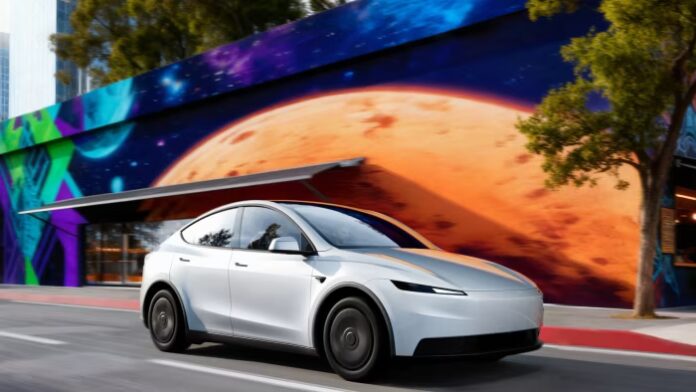Unlock the Editor’s Digest for free
Roula Khalaf, Editor of the FT, selects her favourite stories in this weekly newsletter.
Tesla said its profit fell more than a quarter as increased costs from US tariffs, the loss of emissions credit revenue and the vast expense of its pivot to robotics and artificial intelligence ate into its margins.
Elon Musk’s electric-car maker on Wednesday reported its third-quarter adjusted net income fell 29 per cent year-on-year to $1.8bn, missing expectations of $1.9bn.
Investors had hoped for a boost from record vehicle sales in the quarter, as consumers rushed to make purchases before the US ended a green vehicle incentive. But extra costs, including spending on AI talent, eroded Tesla’s profits.
Revenue surpassed analysts’ estimates of $26.6bn compiled by Visible Alpha, rising 12 per cent to $28.1bn. However, its operating margin almost halved to 5.8 per cent from 10.8 per cent a year earlier.
Tesla shares dipped about 3.5 per cent in after-market trading.
Chief financial officer Vaibhav Taneja said tariffs were causing “headwinds” for its core car and battery energy storage businesses, costing more than $400mn in the quarter split evenly between them.
Donald Trump’s global trade war has made sourcing and importing essential EV components such as rare minerals far more expensive, while affecting shipments from its factories around the world.
Tesla and Musk have lobbied the government against steep tariffs, warning of a hit to its profits and making it a target for retaliation, to little avail.
Investors were initially optimistic that Tesla would benefit from Musk’s alliance with Trump. But the consumer backlash over the chief executive’s political activities, sweeping policy changes around EVs and the public falling out between the US president and the world’s richest man have knocked the carmaker’s fortunes.
The earnings come as Tesla is pushing shareholders to vote in favour of a proposed $1tn share package for Musk at its November 6 annual meeting. The plan could award the billionaire as much as 12 per cent more stock if ambitious targets are hit.
The board has argued it is necessary to motivate and retain the chief executive, who has threatened to leave if he does not control at least a quarter of the shares.
Musk insists he must be able to block activist investors as he develops powerful AI and sells millions of humanoid robots.
Proxy advisers Institutional Shareholder Services and Glass Lewis, who advise institutional investors on shareholder votes, have counselled against the plan.
They citied its “striking magnitude” and the lack of binding terms to ensure Musk’s commitment to Tesla as he presides over a growing number of companies from SpaceX to xAI and engages in political activism.
Musk attacked both organisations on Wednesday, calling them “corporate terrorists” that give bad advice to passive institutional shareholders.
“I just don’t feel comfortable building a robot army and then being ousted because of some asinine recommendations from ISS and Glass Lewis who have no freaking clue.”
Musk has urged shareholders to focus on the promise of self-driving cars, AI and robots as Trump slashes environmental policies that have been critical to Tesla’s business.
Earlier this month, Tesla disclosed a record 497,099 vehicles deliveries in the three months to the end of September.
The sales bump was driven by customers rushing to buy electric cars ahead of the expiry of a $7,500 federal tax credit on September 30.
However, the temporary boost from those sales was more than outweighed by a sharp decline in profit from schemes allowing Tesla to sell emissions credits to rivals that build more polluting petrol vehicles.
Income from regulatory credits trading plunged 44 per cent to $417mn in the quarter after the US government reduced fines for non-compliance on car emissions standards to zero, in effect killing the trading schemes.
Tesla made $2.8bn in profit from trading programmes last year, with about three-quarters of that coming from the US, the Financial Times has reported. Those earnings are likely to dwindle.

The company hopes the release of a refreshed edition of its flagship Model Y as well as a cheaper, stripped down version will help rejuvenate sales and compensate for the lost credit trading revenue.
Tesla executives also pointed to growth in its energy generation and storage division as a reason for optimism. Revenue surged 44 per cent to a record $3.4bn, as it deployed more commercial and retail battery packs to store cheap energy.
Services revenue — which includes its “full-self driving” assistance software and its EV Supercharger network — rose 25 per cent to $3.5bn.
Operating expenses rose 50 per cent to $3.4bn, with Tesla spending vast sums on acquiring advanced Nvidia chips to power its ambitions in AI as Musk repositions the company towards autonomous driving, prepares to launch robotaxis and builds humanoid robots.
Tesla said it has 81,000 Nvidia H100 GPUs in its Cortex data centre at its Gigafactory in Austin, Texas.
Taneja, the CFO, forecast its capital expenditure it will “increase substantially in 2026 as we prepare the company for the next phase of growth” — rising from about $9bn this year.
Staff costs are also spiralling amid a war for AI talent in Silicon Valley, with rivals offering $100mn-plus pay packages to lure researchers and engineers.
“We have recently granted various performance-based equity awards to employees working on AI initiatives,” Taneja said. “Such spend will continue to increase going forward.”
Source link






